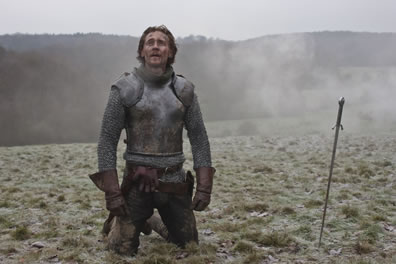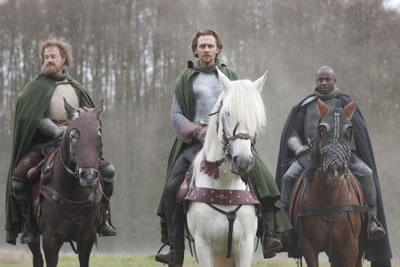The Hollow Crown: Henry V
The Crown Comes Full Circle
Neal Street Productions, NBC/Universal International, WNET THIRTEEN (2012)
Directed by Thea Sharrock. Tom Hiddleston, Jérémie Covillault, Anton Lesser, Paterson Joseph, Lambert Wilson, Paul Ritter, Mélanie Thierry, Geraldine Chaplin, Julie Walters, John Hurt

King Henry V (Tom Hiddleston) after the Battle of Agincourt, above. Below, he rides with Fluellen (Owen Teale, left) and the Duke of York (Paterson Joseph) during the king's campaign to conquer france in Henry V, filmed for The Hollow Crown airing on PBS. Photos by Nick Briggs, Neal Street Productions.
As The Hollow Crown reaches its fourth installment and third monarch—and with that monarch, the third director in this set of William Shakespeare history plays scheduled to air Friday nights on PBS beginning Sept. 20 (check local listings)—it seems to have strayed from the thematic arc so carefully established way back in Richard II. In that first play, director Rupert Goold spent much visual and textual energy on developing the hollow crown imagery.
Henry V director Thea Sharrock doesn't even include Henry's pivotal soliloquy when, after wandering through his army's camp on the eve of Agincourt, he ponders kingly authority and the mere ceremony that divides king from commoner. It's a speech that goes to the heart of Shakespeare's discussion of crown versus man. Sharrock seems to be more intent on telling a good yarn, picking up in style from Richard Eyre's direction of the two parts of Henry IV, and further developing the story of how wild Prince Hal becomes great King Harry with the now-indispensable Tom Hiddleston continuing his role as Hal leading yet another high-caliber cast achieving incredible performances. Yet, Sharrock has some cinematic tricks up her sleeve, and you have to watch carefully to pick up on how effectively she brings this series resoundingly thematically home.
While she's a most capable cinematic director, Sharrock takes many liberties with Shakespeare's text that will leave purists crying foul. Clocking in at 2:18, this Henry V, in addition to jettisoning Henry's keynote soliloquy, cuts the Southampton scene in its entirety, skips completely over the Salic law argument by the Archbishop of Canterbury that justifies Henry's invasion of France, and drops the four captains, leaving just a bit of pribble prabble from Fluellen (the Welsh captain even leads a counter-attack by sneaking his army through the woods to surprise the French, which, look you, I figure Shakespeare's Fluellen would consider clearly not in keeping with the disciplines of war). At Agincourt, instead of Pistol capturing a French knight, we see him succumbing to PTSD, and instead of the French attacking the boys guarding the luggage, one Frenchman—the Constable—stabs York from behind as the English nobleman is comforting Falstaff's onetime page. The French lords' scenes leading into Agincourt are reduced to just four lines in three quick-edit sequences juxtaposed with the three episodes that comprise the "touch of Harry in the night" scene. Rather than depicting the French as foolish, Sharrock gets rid of their comic banter and presents them as brave warriors, including the Dauphin.
Sharrock also plays loose with the text, often scrambling phrases from here and there to create a new script, altering the order of scenes that then require further alterations in who says what, and even adding a line or two where she thinks necessary. One notable example of the last is when Henry orders the killing of the French prisoners, Exeter (Anton Lesser) offers a shocked, cautionary—but extratextual—"My lord," leading Hiddleston's Hal to shout "Go and tell them so." We then witness this needless slaughter and violation of the code of combat. Furthermore, without the scene of the French massacring the boys, we are left without a retaliatory justification for Henry's massacring the French prisoners.
However, in other ways, Sharrock sets right some fundamental elements in the structure of this play that tradition has traduced. Shakespeare himself is fuzzy as to Henry's reasoning behind killing the prisoners. Shakespeare has Fluellen and Captain Gower describe the king issuing the retaliatory order when they report the massacre of the boys and destruction of the king's luggage, but Henry himself twice orders the French prisoners' throats cut when he sees French cavalry still in action. "I was not angry since I came to France until this instant" in Shakespeare's text seems to refer to a French cavalry troop poised on the hill overlooking the battlefield. So which is it? Sharrock cuts the Fluellen/Gower scenes, so her version puts the onus totally on Henry making a tactical decision to kill the prisoners.
Her other seemingly misguided choice is to have Henry speak his famous band of brothers speech privately to the nobles and not to the army. However, this is Shakespeare's direction: only the lords are present for this scene, and if Shakespeare had wanted to, he would have had the king address his army, as he had other kings do in plays prior to Henry V. Sharrock's adherence to the original here is keenly important in the portrayal of Henry. Prior to Agincourt, Henry's wild-youth reputation still precedes him; he's aware of that for all the whisperings in the court and the ridicule from the French. In Hiddleston's portrayal, Henry wants full acceptance of the court and seems uncertain that he has it, even though Exeter's testimony to the French indicates he has. When Henry borrows Sir Erpingham's cloak, the old knight played by Paul Freeman enthusiastically says, "The Lord in heaven bless thee, noble Harry." The king's following line, "God-a-mercy, old heart! Thou speak'st cheerfully," Hiddleston says directly to Erpingham rather than after the senior knight's exit, indication that Harry is relieved to receive the affirmation.
In giving the band of brothers speech only to the nobles, Henry fully intends to win over their support because it is their leadership of the various elements of the army that will be necessary to win the day. Hiddleston gives a gorgeous rendition of this speech, speaking from the heart as he addresses each nobleman in turn. When he gets to the crux line, "We few, we happy few, we band of brothers," Hiddleston pauses between each phrase, and there is in his eyes a certainty of futility and an equal certainty that any futility can yet, somehow, be overcome as long as you start out with the confidence that it can be overcome.
Henry V is the play of great speeches, and Hiddleston brings fresh readings to each one because of their contextual presentations. "Once more unto the breach" is Henry regrouping his forces in the middle of the battle for Harfleur, and Hiddleston, rather than giving a stirring pep talk, speaks it as a coach directing his men, each line delivered as if it were a tip on how to fight in combat. Only at the end does he turn inspirational with "God for Harry, England, and Saint George!" like breaking the huddle with "One, Two, Three, GO TEAM!" Henry delivers his vicious threat to Harfleur on horseback with the women his men would rape, the infants who would be spitted on pikes, and the old men whose heads would be dashed to the walls standing there in attendance, accompanying the city's governor. The other English lords look upon Henry somewhat uneasily, but his troops love it.
Hiddleston, except when he's exhausted from long marches and intense battles, maintains the exuberant youthfulness of his Prince Hal days. At the beginning he's riding his horse across the fields, reaches the castle and rushes in to meet with the ambassadors, grabbing his crown from off a pillow as he passes into the throne room. In his courting of Princess Katherine at the end, we realize he has never wooed a woman—he never had to in Eastcheap. Katherine (Mélanie Thierry), meanwhile, considers him a fool at first, and Alice (Geraldine Chaplin) obviously does not like him. But when Henry takes off his crown and lays it on the chair where Katherine had been sitting, Alice is astonished. At first she stares uncomprehendingly at the crown on the chair, but then she starts following Henry, unable to take her eyes off him as he continues to woo Catherine. "Beshrew my father's ambition!" Henry says, and addresses this to Alice as a confidante: "He was thinking of civil wars when he got me: therefore was I created with a stubborn outside, with an aspect of iron, that when I come to woo ladies, I fright them." Alice is won, and Katherine laughs. It's not too much longer before Henry wins Katherine, and as her father re-enters, Henry quickly crowns himself again.
Such subtle details as Alice's staring at the crown in the chair are moments of quality acting that lift this movie to high art: Julie Waters as Mistress Quickly describing Falstaff's death; the late Richard Griffiths in one of his final roles giving a delightful turn portraying Burgundy as the disarming negotiator; Paterson Joseph as York, dying in the boys' arms, playing the coming on of death so honestly it will haunt your dreams. The boy (George Sargeant) tries to stop the bleeding with his St. George's cross armband, and when he can't, he breaks into tears. That armband comes into play at a key moment later in the production.
Montjoy, the French herald, is one of the production's most intriguing portrayals. Jérémie Covillault plays him as the consummate professional, his attitude and inflections representing the specific individual whose message he is delivering, whether it's the immature Dauphin, the haughty French king, or the blunt Constable. Message delivered, Montjoy becomes a dispassionate listening post. "Thou dost thy office fairly," Henry tells him, and Montjoy appreciates the appreciation. Through the course of the play, Montjoy becomes Henry's true benchmark tracker, initially calling him "your highness," then "King Harry," and finally, after Agincourt, "great king."
 John Hurt performs the part of Chorus in voice-over. Really, the movie itself plays the part of Chorus, as Sharrock, during Chorus's passages, cuts from court to court to Eastcheap to ships sailing to armies preparing. When Chorus first starts speaking at the movie's opening, though, we are watching a funeral: Henry V's, with Katherine in attendance. For Chorus's last oration, we return to the funeral and see the future of England, the infant Henry VI (in Alice's arms) and the British lords who will soon rip the nation apart again with civil war. Also in attendance at Henry's funeral is Montjoy, and afterward we meet Chorus in person and realize he's been there throughout the movie, appearing in almost every scene, sometimes almost indiscernible in the background. Chorus stands in front of the empty throne when he speaks his last line, referring to the politicians who "made his England bleed. For their sake, in your fair minds let this acceptance take."
John Hurt performs the part of Chorus in voice-over. Really, the movie itself plays the part of Chorus, as Sharrock, during Chorus's passages, cuts from court to court to Eastcheap to ships sailing to armies preparing. When Chorus first starts speaking at the movie's opening, though, we are watching a funeral: Henry V's, with Katherine in attendance. For Chorus's last oration, we return to the funeral and see the future of England, the infant Henry VI (in Alice's arms) and the British lords who will soon rip the nation apart again with civil war. Also in attendance at Henry's funeral is Montjoy, and afterward we meet Chorus in person and realize he's been there throughout the movie, appearing in almost every scene, sometimes almost indiscernible in the background. Chorus stands in front of the empty throne when he speaks his last line, referring to the politicians who "made his England bleed. For their sake, in your fair minds let this acceptance take."
Cut from this passage is Shakespeare's reference to his first history tetralogy "which oft our stage hath shown." With Chorus's epilogue, Shakespeare comes full circle, not just completing the War of the Roses cycle but putting Henry V's reign in an important context: it was a brief period of English pride amidst almost a hundred years of civil strife. In her way, Sharrock brings The Hollow Crown full circle, too, using Henry's funeral and Chorus's initial appearance (though that appearance comes when he speaks his final line) to reflect back on the very first scene of the series, Richard II sitting in that throne as we hear a voice-over of his speech, "Let's talk of graves, of worms, and epitaphs." From Richard's time, to Chorus's time a hundred years on, to our times, it's not the crowns that are hollow but the fighting over those crowns. The one truly great leader is the person who willingly laid aside his crown for living and for loving.
Eric Minton
September 13, 2013
Comment: e-mail [email protected]
Start a discussion in the Bardroom



 Find additional Shakespeareances
Find additional Shakespeareances